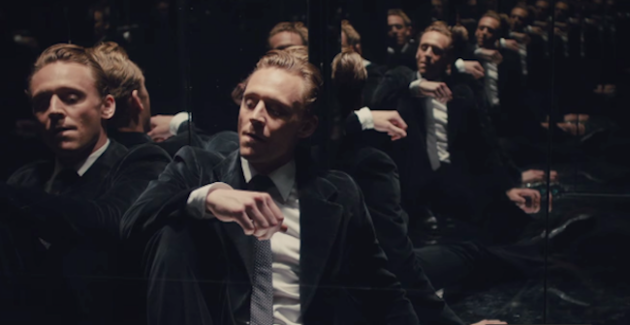
JG Ballard's High-Rise was published in 1970s. This was the time of London Garbage Strike, the rise of punk movement, the rise of Thatcher and conservatism and the Winter of Discontent. In this parable, he saw our materialistic society contained in a 40 story concrete high-rise building. This complete biosphere is equipped with a supermarket, swimming pools, gym, a rooftop garden and a ground parking space that stretches as far as eye can see in this imagined, still barren and developing London suburb. He painted an ugly, disturbing picture of how quickly this microcosm of our society devolved into anarchy with greed and desire for power. Just like his other novels that took place in a materialistic, soulless machine age, High-Rise was a far-fetched, all out satire. With that, Ben Wheatley, a talented British director of such films as Kill List and Sightseers, takes on this darkly satirical material and wastes no time in plunging it into total chaos. The material is highly relevant to the late stages of capitalistic society we are living in.
This highly stylized film sees a physiologist/prof Dr. Laing (Tom Hiddleston) in the center, who just moved in to a much prized high-rise, on the respectable 25th floor. He is an embodiment of upper-middle class, whose meek demeanor and antipathy suits the supposedly anonymous apartment living perfectly. Impeccably dressed and stoic, Laing tries to keep to himself. Charlotte (Sienna Miller), a foxy single-mom neighbor from a floor above, takes a liking to him and introduces to the upper-upper class of the food chain of the high-rise which revolves around Royal (Jeremy Irons), the architect of the high-rise and its sister buildings sprouting up nearby, who with his snobby young wife occupies the penthouse with a private lift. His entourage includes a well-known TV announcer, Cosgrove (Peter Ferdinando), a gynecologist Pangborne (James Purefoy, in his best British twit) and his bodyguard (Dan Renton Skinner). Laing quickly realizes himself that he is not the top one percent and is put in his place. Then there is hard partying TV cameraman Wilder (Luke Evans in his best performance) who lives on the first floor with his very pregnant wife (Elizatbeth Moss) and two young kids. He represents the working class, whose determination to taste the high-life and Royal's gang trying to suppress him are the two main drives for the narrative.
Things devolves quickly into anarchy (the film starts with Laing in disheveled clothes and prickly beard looking like a Robinson Crusoe in an urban decay eating dog food out of a can surrounded by mountains of black garbage bags and debris and the next scene is 3 months earlier). Wilder, incensed by his kids and other children from the lower floors (only lower floor residents seem to have kids) rejected by entering the pool, located on 30th floor for making too much noise, he commandiers all the kids to go up through the stairs (elevators are constantly out of service) and break into a private pool party held by upper floor residents. The tension between upper and lower residents grows with rumors of checkout girl (from the lower floor) at the supermarket being fondled by upper floor residents in the elevator. Things gets violent with retaliations on their pets, and violent raid gangs are formed on both sides and women get assaulted. Strangely, even though garbage shoots get jammed, water stops running, electricity fails, all expensive cars down below get smashed by falling liquor bottles, people are reluctant to leave the building. A police patrol car stops by because of the state of the parking lot and the destroyed lobby seen through the garbage blocked, spray paint covered glass doors. Royal happens to be at the lobby, looking for his wife. He tells officers that everything is fine. Laing stops going to work all together. Everybody is into playing the parts of this addictive game, called social hierarchy in the capitalistic society.
High-Rise's pacing is so breathless that if you haven't read the book, you might find yourself being lost quickly. Why do they devolve so quickly into chaos? What's the reason for all the resentment? Wheatley and collaborator Amy Jump explain too much and too little. There are a lot of character omissions and some of the choices are too explanatory, leaving little rooms for mystery as in the book. Wilder's ascension to the top floor, that symbolic physical trip is the driving force of the book, not meeting Royal the architect as in the movie. I'd like to have seen that actual journey.
There are a lot to like in High-Rise. The look of the film: all textured concrete but chintzy furnishing of the 70s gives the world much sleazier feel than the usual retro-futuristic, cold, antiseptic world that we see too often in films. Even though it doesn't go far into cannibalism as in the book, it's a fun, entertaining film.